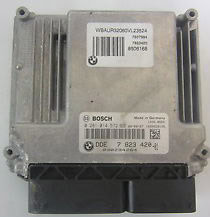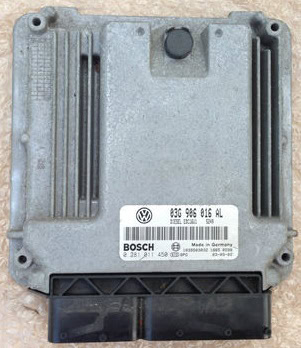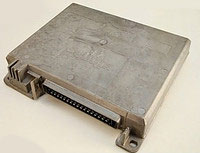In the ever-evolving world of automotive technology, the Electronic Control Unit (ECU) plays a pivotal role in ensuring the optimal performance, efficiency, and safety of modern vehicles. ECUs act as the brain of a car, controlling various systems such as engine performance, emissions, safety features, and even entertainment. This comparative analysis delves into Ford’s ECUs and how they stack up against those of other automakers, shedding light on the unique attributes that set them apart.
Understanding the ECU
An Electronic Control Unit is essentially a computer that manages the various components of a vehicle. It processes data from numerous sensors and makes real-time adjustments to optimize engine performance, fuel efficiency, emissions, and safety. ECUs have become increasingly sophisticated over the years, thanks to advancements in software, hardware, and connectivity.
Read more: What You Should Know Before Getting A Car Warranty Service At Non-Dealer
Ford’s ECU
Ford, one of the world’s leading automakers, has a reputation for integrating cutting-edge technology into its vehicles. The company’s ECUs are no exception. Ford’s ECUs are part of its overarching FordPass Connect system, which allows for remote vehicle control, diagnostics, and even over-the-air updates. Here are some of the key features that set Ford’s ECUs apart:
- Connectivity: Ford’s ECUs are known for their robust connectivity options. They enable remote start, locking and unlocking, and even locating your vehicle through a smartphone app. Additionally, Ford’s ECUs can receive over-the-air software updates, keeping vehicles up to date with the latest features and improvements.
- Advanced Driver Assistance Systems (ADAS): Ford’s ECU integrates various ADAS features, such as adaptive cruise control, lane-keeping assist, and automated emergency braking. These systems rely on advanced sensor data and real-time processing to enhance safety and driver convenience.
- Hybrid and Electric Vehicle Integration: Ford has embraced the shift towards electrification. Their ECUs are designed to manage the unique powertrains of hybrid and electric vehicles, optimizing energy regeneration, electric motor control, and battery management.
Comparative Analysis
To provide a comprehensive analysis, we’ll compare Ford’s ECUs with those of two other leading automakers: Toyota and Tesla.

Toyota’s ECU
Toyota is renowned for its reliability, and their ECUs are no exception. Toyota’s ECUs focus on seamless and efficient performance. Some of their notable features include:
- Reliability: Toyota’s ECUs are known for their durability and longevity, which align with the brand’s reputation for long-lasting vehicles.
- Fuel Efficiency: Toyota places a significant emphasis on fuel efficiency, and their ECUs are designed to optimize the fuel economy of their vehicles.
- Hybrids: Toyota has been a pioneer in hybrid technology, and their ECUs are finely tuned for managing hybrid powertrains.
Read more: BMW ECU Programming and Software Updates: What You Need to Know
Tesla’s ECU
Tesla, as an electric vehicle (EV) leader, has a unique approach to ECU technology. Tesla’s ECUs are heavily software-centric and offer the following advantages:
- Over-the-Air Updates: Tesla is well-known for its frequent over-the-air software updates, enabling continuous improvements in performance, features, and safety.
- Autonomous Driving: Tesla’s ECUs are at the core of their Autopilot system, which aims to achieve full self-driving capabilities.
- Instant Torque Control: Being an EV manufacturer, Tesla’s ECUs provide instant torque control for thrilling acceleration and performance.
Commonly Asked Questions
What is an ECU, and what does it do?
An Electronic Control Unit (ECU) is a computerized control system in a vehicle that manages and controls various functions and systems, such as the engine, transmission, safety features, and entertainment systems. It processes data from sensors to optimize vehicle performance, fuel efficiency, and safety.
How does Ford’s ECU differ from other automakers’ ECUs?
Ford’s ECUs often stand out due to their robust connectivity, including remote control features and over-the-air updates. They also integrate advanced driver assistance systems (ADAS) and are tailored for managing hybrid and electric powertrains.
What is the primary function of Toyota’s ECU?
Toyota’s ECUs are known for their reliability and are designed to optimize fuel efficiency. They are particularly well-suited for managing hybrid powertrains, contributing to Toyota’s reputation for durable and efficient vehicles.
What sets Tesla’s ECU apart?
Tesla’s ECUs are at the forefront of electric vehicle technology. They enable over-the-air updates, play a central role in the Autopilot system for autonomous driving, and provide precise control over electric powertrains, delivering instant torque for high performance.
Can I upgrade or modify my vehicle’s ECU for better performance?
It’s possible to modify or “tune” an ECU to enhance performance, but it should be done with caution and ideally by professionals. Modifications can impact vehicle warranties and emissions compliance. Always consult with experts or the manufacturer before making any ECU modifications.
Are all ECUs in modern vehicles interconnected?
Many modern ECUs are interconnected to some extent, allowing for data exchange and coordinated vehicle functions. This interconnectivity is essential for advanced features like ADAS, over-the-air updates, and hybrid or electric vehicle management.
How often should I update my vehicle’s ECU software?
The frequency of ECU software updates varies by manufacturer and model. Some manufacturers provide over-the-air updates, while others recommend periodic visits to a dealership for updates. It’s essential to stay informed about your vehicle’s update schedule and install updates promptly for optimal performance and safety.
Can I diagnose ECU issues on my own?
While there are tools and devices available for DIY diagnostics, diagnosing and fixing ECU issues is often complex and best left to professionals. ECU problems can affect various vehicle systems, so it’s essential to consult with a qualified technician to address any issues.
How do ECUs contribute to vehicle safety?
ECUs are crucial for modern safety features, such as adaptive cruise control, lane-keeping assist, and automated emergency braking. These systems rely on real-time data processing by the ECU to enhance driver safety.
Are there security concerns related to ECU technology?
Yes, as ECUs become more interconnected and reliant on software, there are security concerns related to hacking and cyberattacks. Manufacturers invest in cybersecurity measures to protect vehicle systems, and vehicle owners should follow best practices to maintain a secure connection to their ECU.
How can we help?
At ECU Repairs, we not only repair the ecu’s but also carry a large number of units in stock ready to swap and are constantly updating our stock lists to hold the more demand ecu’s and offer our customers a wider range.
With the latest in technology test rigs setup to extensively test all ecu’s as though they were plugged in to the vehicle. We test all ECU units for up to 24-48 hours so we’re able to verify every fault found and also catch out intermittent faults and possibly any the customer was not even aware of.
Conclusion
In the automotive industry, the Electronic Control Unit plays a vital role in the performance, efficiency, and safety of vehicles. While Ford’s ECUs are known for their robust connectivity and advanced features, other automakers like Toyota and Tesla have their own unique strengths, focusing on reliability, fuel efficiency, and cutting-edge electric vehicle technology.
Ultimately, the choice between Ford’s ECUs and those of other automakers depends on individual preferences, needs, and priorities. Ford excels in providing a comprehensive and connected experience, while Toyota emphasizes reliability and fuel efficiency, and Tesla pioneers electric and autonomous driving technology. As technology continues to evolve, we can expect even more innovation and competition in the realm of ECUs, benefiting consumers with improved vehicle performance and safety.



